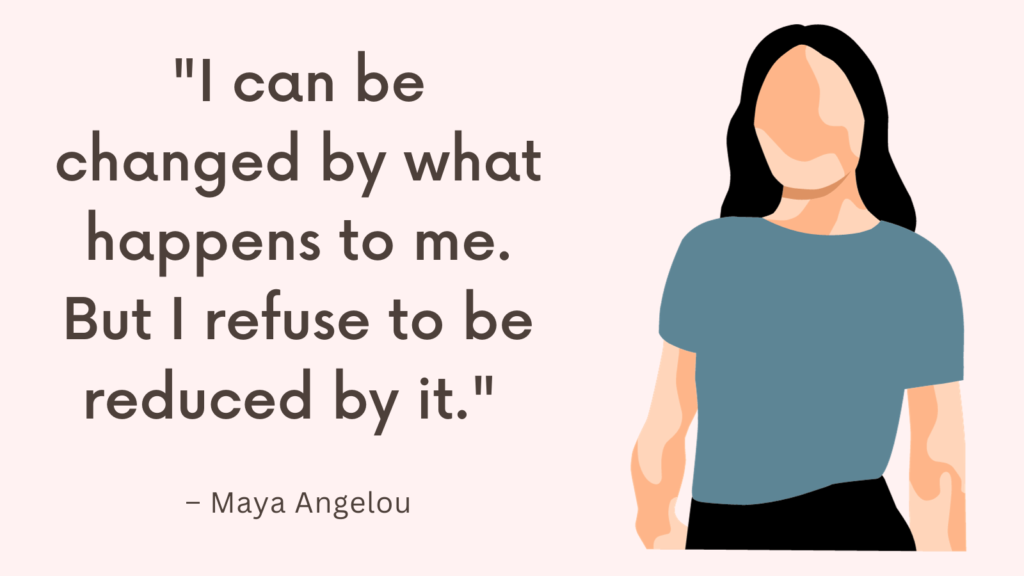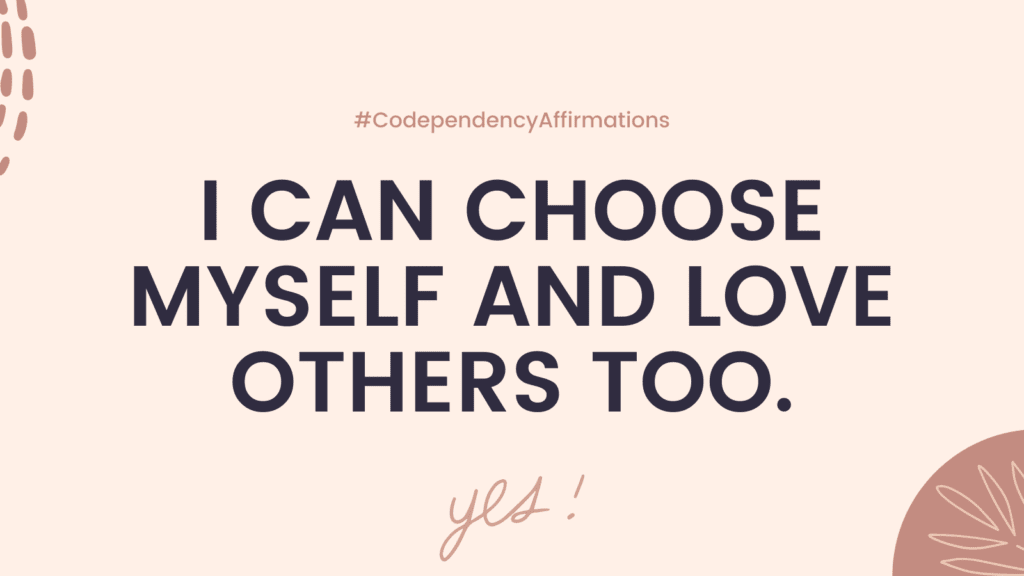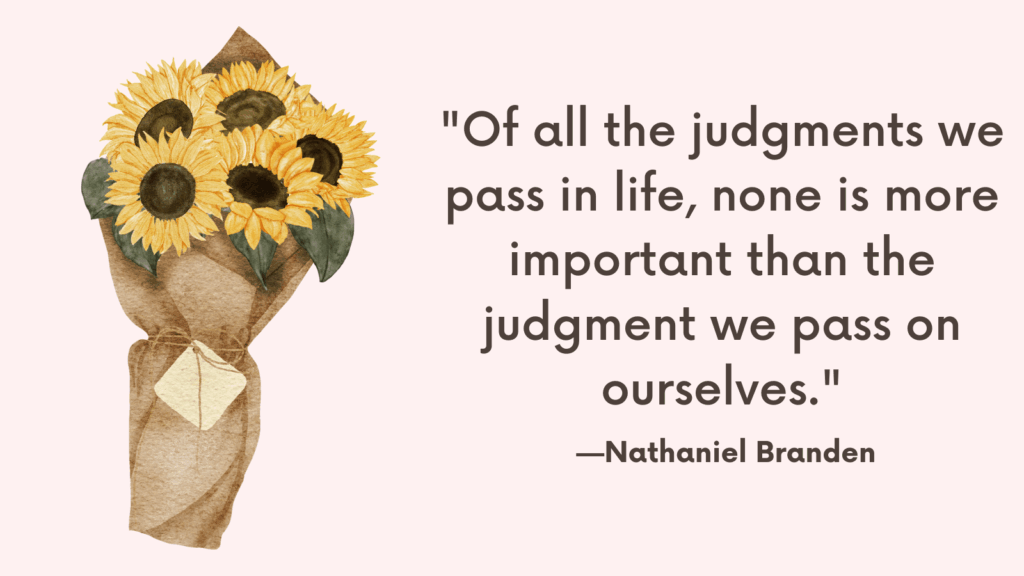This post contains signs you’re healing from codependency.
What Is Codependency?
Codependency refers to a pattern of dysfunctional and unhealthy behaviors, thoughts, and emotions that often develop within the context of close relationships.
It typically involves an excessive reliance on another person for emotional support, validation, and a sense of self-worth.
Codependent individuals often prioritize the needs and desires of others over their own, leading to a neglect of their own well-being.
Codependency can manifest in various ways, but some common signs and characteristics include:
1. Low self-esteem: Codependent individuals tend to have a poor sense of self-worth and may feel inadequate or dependent on others for validation.
2. People-pleasing behavior: Codependents often go to great lengths to please others, disregarding their own needs and sacrificing their own happiness in the process.
3. Enabling and caretaking: Codependents frequently take on a caregiving role, assuming responsibility for the emotional and physical well-being of others, even at the expense of their own health.
4. Difficulty setting boundaries: Codependent individuals struggle to establish and maintain healthy boundaries, often feeling guilty or anxious when asserting their own needs or saying no to others’ requests.
5. Fear of abandonment: Codependents may have an intense fear of being alone or abandoned, leading them to cling to unhealthy relationships and tolerate mistreatment.
6. Overly controlling behavior: Codependent individuals may engage in controlling behaviors in an attempt to manage or manipulate the actions and emotions of others.
7. Lack of personal fulfillment: Codependency often results in a diminished sense of personal identity and a lack of fulfillment in one’s own life, as the focus is primarily on meeting the needs of others.
Codependency can stem from various factors, including childhood experiences, dysfunctional family dynamics, and past traumas. It is often intertwined with other mental health issues such as anxiety, depression, or addiction.
Related: How To Break Codependency Habits For Good? (+FREE Codependency Worksheets)
Top 10 Signs You’re Healing from Codependency
It’s important to celebrate and acknowledge progress on this journey towards healthier relationships and self-empowerment.
While codependency recovery is a unique process for each individual, here are some common signs that indicate you may be healing from codependency:
1. Increased Self-Awareness
One of the primary steps towards healing from codependency is developing self-awareness.
If you find yourself becoming more aware of your patterns, behaviors, and emotional responses within relationships, it indicates growth.
Recognizing codependent tendencies is crucial for changing them.
2. Setting Boundaries
Establishing and enforcing healthy boundaries is a fundamental aspect of overcoming codependency.
If you notice yourself setting boundaries with others and communicating your needs and limits more effectively, it demonstrates progress.
This includes saying no when necessary and prioritizing self-care.
3. Improved Self-Esteem
Healing from codependency often involves working on self-esteem.
If you find yourself feeling more confident in your abilities, valuing your opinions, and respecting your own worth, it indicates positive growth.
You begin to realize that your self-worth does not rely solely on others’ validation or approval.
Related: Top 18 Self Esteem Exercises (+FREE CBT For Self-Esteem Worksheets PDF)
4. Embracing Independence
Codependent individuals tend to rely heavily on others for their emotional well-being and decision-making.
As you heal from codependency, you’ll notice a shift towards embracing your independence.
This may involve making choices based on your own needs and desires rather than seeking constant validation from others.
5. Honoring Your Emotional Needs
In the past, you may have neglected your own emotions while prioritizing those of others.
However, as you heal from codependency, you’ll begin to value and prioritize your emotional well-being.
This includes acknowledging and addressing your feelings, seeking support when needed, and practicing self-compassion.
6. Developing Healthy Relationships
A significant sign of healing is the ability to establish and maintain healthy relationships.
You become more discerning about whom you allow into your life, choosing individuals who respect your boundaries, treat you with kindness, and support your growth.
Healthy relationships become a mutual exchange of love, care, and respect.
Related: People Pleaser Quiz (+Top 21 Proven Ways to Stop People Pleasing)
7. Improved Communication Skills
Healing from codependency often involves developing healthy communication skills.
If you find yourself becoming more assertive, expressing your thoughts and feelings more openly, and engaging in honest and effective communication, it suggests progress.
Effective communication helps create healthier connections and resolves conflicts.
8. Engaging in Self-Care
Codependent individuals often prioritize the needs of others above their own.
However, as you heal, you’ll notice an increased focus on self-care.
Taking time for yourself, engaging in activities that bring you joy, practicing relaxation techniques, and prioritizing your physical and mental health demonstrate progress and self-nurturing behavior.
9. Addressing Past Traumas
Many individuals with codependency have experienced past traumas that contribute to their relational patterns.
Healing involves addressing and processing these traumas.
If you find yourself seeking therapy, support groups, or other resources to address past wounds, it indicates a commitment to healing and growth.
10. Celebrating Autonomy
As you heal from codependency, you’ll start celebrating your autonomy and embracing your individuality.
You recognize that your happiness and fulfillment come from within, rather than solely relying on others.
This newfound independence allows you to make decisions that align with your values and aspirations.
Related: Top 10 Signs Of Trauma Bonding & How To Heal A Trauma Bond

Conclusion
It’s important to note that healing from codependency is a gradual and ongoing process that requires patience, self-compassion, and sometimes professional support.
These signs indicate progress, but setbacks can occur along the way.
If you’re on this journey, consider consulting with a therapist or psychologist who specializes in codependency to provide guidance and further support.



